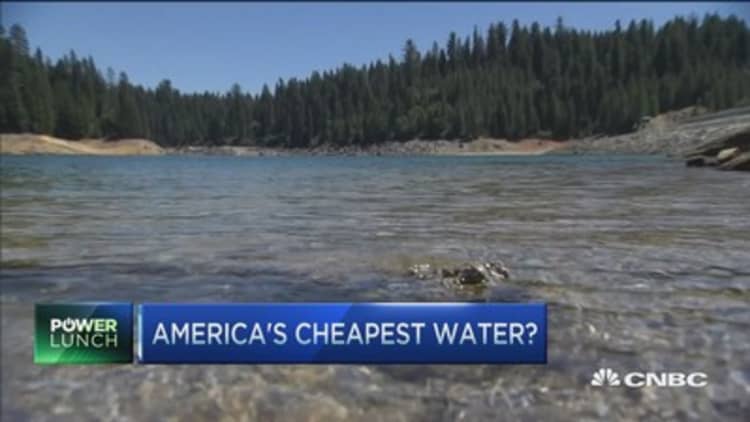
Up a winding mountain road in California gold country, hidden by groves of redwood and pine—along with pockets of humanity living off the grid—is a reservoir with the cheapest water in America.
For every 100 cubic feet of water—a standard measure that equals 748 gallons—customers pay 42 cents in Oroville, California. (Tweet This) That's cheaper than anywhere else, according to an American Water Works Association survey of water agencies.
"We have an abundance of stored water," said Michael Glaze, general manager of the South Feather Water and Power agency, located in southern Butte County near the old gold mining town of Oroville. "At the end of the year I will still have 10 years of consumption in storage."
South Feather is proof that location, foresight and luck are everything. Decades ago, the creators of the water agency built two reservoirs upstream to power a hydroelectric plant. Water storage became an added bonus. The power from the plant is sold to PG&E, and that money covers 60 percent of the cost of water. Even without that subsidy, South Feather customers would only pay $1.02 per unit.
"I think we're very fortunate to live in this part of the state," said Steve Sebastain, a South Feather customer who was getting his hair cut at a barber shop in downtown Oroville this week. His wife, Tina, said they spend $22 a month on water, "and I have three teenagers."
Not everyone's so lucky
Not everyone in Oroville is so lucky. There are three water agencies covering the area, and some residents pay higher rates. Lake Oroville, a major reservoir for much of the state, is seriously depleted. But South Feather's reservoirs are upstream of the reservoir, closer to the water's source, and the agency has very senior water rights.
"I think it's wrong," barber Jim Townsend said of varying water rates. "Let's even it out a little bit."
Read MoreDrought to deluge? El Nino's impact on California
"Our reservoirs were built for our purposes independently. We're not obligated to state water contractors or anyone downstream," said Glaze. However, his two reservoirs can store only 160,000 acre feet of water in a watershed that can generate up to 350,000 acre feet. "The difference goes to Lake Oroville and the rest of the state."
The state may want more. It has ordered South Feather to cut overall water usage by 36 percent, and Glaze expects to achieve that with voluntary cutbacks and by tightening operations. Ironically, the saved water will stay in the reservoir for South Feather customers. "The water we conserve does not go downstream," he said.
'We will defend those water rights vigorously.'
At the same time, California water authorities are looking at forcing those with even the most senior rights to give up more water. A group of farmers last week agreed to voluntarily cut 25 percent of their water this year in exchange for promises that there would be no further cuts. The state is hoping other senior rights holders will follow suit and avoid litigation. Glaze has no plans to capitulate.
"We believe the constitution protects our water rights," he said, "and we will defend those water rights vigorously."
Read MoreCalifornia drought: New water rules may not work
He's also part of a local economic alliance that is now pitching Oroville as an "Oasis for Business" with clean, cheap water. The city has hired a representative in Europe to pitch Oroville's water prices as a lure to foreign investors.
"Oroville has been identified as probably the best place in the state of California for biomass energy generation," Glaze said, adding that businesses from Scandinavia are interested in having a look. He vows that water will not be an obstacle, but a bonus, in his part of bone dry California.
"The welcome mat is out," he said, "and the light is on."


